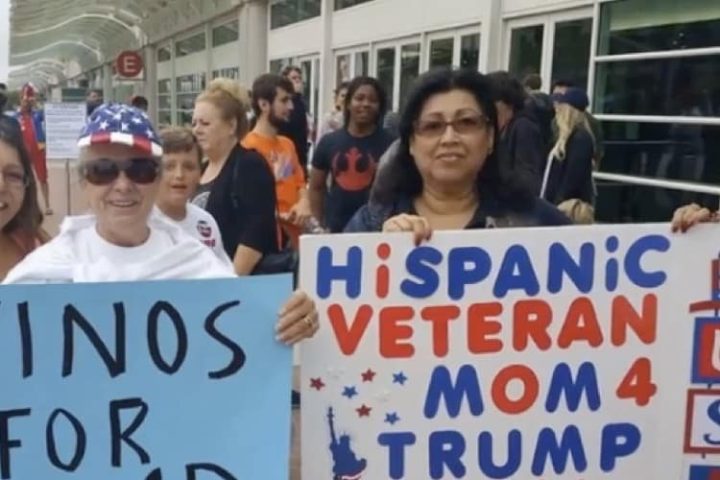
While Cubans have long tended to throw their support to the Republican Party, other Hispanics such as those from Mexico, Central America, and from Puerto Rico are usually written off as part of the Democratic Party coalition.
But Tuesday’s endorsement of President Donald Trump for reelection by the governor of Puerto Rico is indicative of a growing well of support among Hispanics for Republicans in general, and Trump in particular. Governor Wanda Vasquez Garced asked Puerto Ricans to back Trump, telling Telemundo, “I ask all Puerto Ricans who are listening to go vote. They have to go vote, exercise their right to vote and evaluate who has represented being a person who thinks about Puerto Ricans and their needs at the most difficult moment.”
“It is Donald Trump,” said Garced, a Republican.
El Nuevo Dia, a Puerto Rican newspaper reported that Vasquez Garced had been expected to go to central Florida to appear at a campaign rally for Trump last Friday, but the event was cancelled when Trump was diagnosed with COVID-19.
Vasquez Garced has long touted her close relationship with Trump, and last month the Trump administration announced an additional $13 billion in aid for the island to help rebuild infrastructure destroyed or damaged in the 2017 natural disaster.
While Vasquez Garced’s support for Trump is not surprising, considering that she is a Republican, it could prove very important in the swing state of Florida. An estimated one million former residents of Puerto Rico live in the battleground state narrowly carried by Trump in 2016, and the race there is expected to be close again.
The Republican National Committee released a statement on Tuesday that “Vasquez Garced’s endorsement is further proof of the enthusiasm” Trump has among Hispanics.
Not surprisingly, Democrats tried to brush off the endorsement. Tatiana Matta, Latino adviser to the campaign of Democratic presidential candidate Joe Biden, called the endorsement “a desperate, political stunt.” It is an illustration of how Democratic Party leaders tend to dismiss any support for Trump among minority voters, including blacks and Hispanics.
One might recall Biden’s dismissive remark that any African-American even “thinking” of voting for Trump, “ain’t black.”
Even before the endorsement from Governor Vasquez Garced, however, Trump had been polling very well with Hispanics. Trump captured about 28 percent of the Hispanic vote in 2016 (according to exit polls), but is now getting 35 percent in a Pew Poll, and 37 percent in an Emerson College poll among that demographic. This would constitute the highest level of support for a Republican presidential candidate since 2004.
Hillary Clinton lost the purple state of Florida in 2016 to Trump, but she ran 11 points ahead of where Biden presently stands among Hispanics, according to a Democrat polling firm. An NBC/Marist poll released just this past week actually shows Trump ahead of Biden in Florida among Hispanics, 50-46 percent. Similar results were reported in Texas, another state with a high Hispanic population, in the Rice University poll. There — where most of the Hispanics are of Mexican ancestry — Biden trails Clinton’s 2016 support by 18 percent!
Cubans — who have supported Republicans since the 1960s — are a demographic that Democrats were thought to be bleeding away from Republicans, but Trump now leads Biden in that group by 38 points.
These poll results indicate growing support for Trump, and growing dislike of Biden among Hispanics. Hispanics have cited the robust economy before the coronavirus as a reason for supporting Trump over Biden. Free market economics tend to appeal to many Hispanics, who are leaders in the creation of new small businesses. Biden and the Democrats, on the other hand, are recognized among Hispanic small business owners as supporters of increased regulations and higher taxes. Socialism is generally not popular with Hispanics, yet the chairman of the Democratic National Committee, Tom Perez, has touted Representative Alexandria Ocasio-Cortez, a member of the Democratic Socialists of America, as “the future” of his party.
Another problem for Democrats among Hispanics is crime. Rioters burned down many Hispanic-owned businesses this past summer, and a majority of Hispanics oppose the “Defund the Police” movement, supported by many left-wing Democrats.
Republicans have long eyed the Hispanic community as a mission field, so to speak, because of their cultural conservatism and their economic entrepreneurship. Even Trump’s immigration policies — cited as a negative among Hispanics by the mainstream media — are not unpopular with Hispanics. When Trump halted immigration in April to stem the coronavirus outbreak, a Washington Post/University of Maryland poll found that 69 percent of Hispanics nationwide supported the temporary ban. Biden, one might recall, denounced the ban at the time, but Trump’s swift action probably saved thousands of lives.
With Trump increasing his support among African-Americans beyond what he achieved in 2016, Republicans who have long said they need to improve their standing with blacks and Hispanics might finally be getting their wish. But it took Donald Trump to be their genie.



